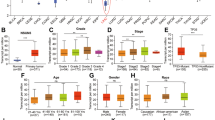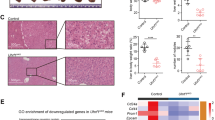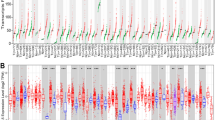Abstract
N6-methyladenosine (m6A) RNA methylation contributes to the cancer stem cell (CSC) phenotype through regulating gene expression. YTHDF2, an m6A reader, was shown to be associated with hepatocellular carcinoma (HCC) patient prognosis. However, the effect of YTHDF2 on liver CSC and cancer metastasis and the molecular mechanism of this effect have not been documented. Here, we show that YTHDF2 expression is negatively correlated with HCC patient survival in both data from the Cancer Genome Atlas (TCGA) database and clinical data from our center. By detecting CD133+ cells and carrying out sphere culture assays, we found that knockdown of YTHDF2 led to impaired stemness in Hep3B and Huh7 cells. In contrast, overexpression of YTHDF2 increased the CSC phenotype. Mechanistically, the knockdown and overexpression of YTHDF2 in liver cancer cells resulted in decreased and increased m6A levels in the 5′-untranslated region (UTR) of OCT4 mRNA, respectively, leading to decreased and increased OCT4 protein expression, respectively. A luciferase activity assay showed that mutation of the corresponding m6A methylation sequence in the 5′-UTR of OCT4 mRNA caused significantly decreased gene expression, suggesting a role for YTHDF2-dependent m6A methylation in protein translation. Polysome profiling results also indicated the knockdown and overexpression of YTHDF2 could decrease and increase OCT4 translation, respectively. In particular, overexpression of OCT4 rescued the impaired stemness caused by YTHDF2 depletion, which confirmed the effect of YTHDF2 on CSC phenotype is dependent on OCT4. In vivo, the loss of YTHDF2 reduced tumor burden and inhibited lung metastasis following orthotopic transplantation in nude mice. Last, we demonstrated that YTHDF2 expression is positively correlated with OCT4 expression and m6A levels in the 5′-UTR of OCT4 mRNA in clinical HCC specimens. In conclusion, YTHDF2 promotes the CSC liver phenotype and cancer metastasis by modulating the m6A methylation of OCT4 mRNA.
This is a preview of subscription content, access via your institution
Access options
Subscribe to this journal
Receive 50 print issues and online access
$259.00 per year
only $5.18 per issue
Buy this article
- Purchase on Springer Link
- Instant access to full article PDF
Prices may be subject to local taxes which are calculated during checkout







Similar content being viewed by others
References
Bray F, Ferlay J, Soerjomataram I, Siegel RL, Torre LA, Jemal A. Global cancer statistics 2018: GLOBOCAN estimates of incidence and mortality worldwide for 36 cancers in 185 countries. CA Cancer J Clin. 2018;68:394–424.
Villanueva A, Hernandez-Gea V, Llovet JM. Medical therapies for hepatocellular carcinoma: a critical view of the evidence. Nat Rev Gastroenterol Hepatol. 2013;10:34–42.
Villanueva A. Hepatocellular carcinoma. N Engl J Med. 2019;380:1450–62.
Plaks V, Kong N, Werb Z. The cancer stem cell niche: how essential is the niche in regulating stemness of tumor cells? Cell Stem Cell. 2015;16:225–38.
Fu Y, Dominissini D, Rechavi G, He C. Gene expression regulation mediated through reversible m(6)A RNA methylation. Nat Rev Genet. 2014;15:293–306.
Cao G, Li HB, Yin Z, Flavell RA. Recent advances in dynamic m6A RNA modification. Open Biol. 2016;6:160003.
Zhou J, Wan J, Gao X, Zhang X, Jaffrey SR, Qian SB. Dynamic m(6)A mRNA methylation directs translational control of heat shock response. Nature. 2015;526:591–4.
Yang Z, Li J, Feng G, Gao S, Wang Y, Zhang S, et al. MicroRNA-145 modulates N(6)-methyladenosine levels by targeting the 3′-untranslated mRNA region of the N(6)-methyladenosine binding YTH domain family 2 protein. J Biol Chem. 2017;292:3614–23.
Zhu P, Wang Y, He L, Huang G, Du Y, Zhang G, et al. ZIC2-dependent OCT4 activation drives self-renewal of human liver cancer stem cells. J Clin Investig. 2015;125:3795–808.
Chen T, Hao YJ, Zhang Y, Li MM, Wang M, Han W, et al. m(6)A RNA methylation is regulated by microRNAs and promotes reprogramming to pluripotency. Cell Stem Cell. 2015;16:289–301.
Zhang C, Samanta D, Lu H, Bullen JW, Zhang H, Chen I. et al. Hypoxia induces the breast cancer stem cell phenotype by HIF-dependent and ALKBH5-mediated m6A-demethylation of NANOG mRNA. Proc Natl Acad Sci USA. 2016;113:e2047–56.
Zhao BS, Nachtergaele S, Roundtree IA, He C. Our views of dynamic N(6)-methyladenosine RNA methylation. RNA. 2018;24:268–72.
Wen J, Lv R, Ma H, Shen H, He C, Wang J, et al. Zc3h13 regulates nuclear RNA m(6)A methylation and mouse embryonic stem cell self-renewal. Mol Cell. 2018;69:1028–38.e1026.
Alarcon CR, Lee H, Goodarzi H, Halberg N, Tavazoie SF. N6-methyladenosine marks primary microRNAs for processing. Nature. 2015;519:482–5.
Wang X, Lu Z, Gomez A, Hon GC, Yue Y, Han D, et al. N6-methyladenosine-dependent regulation of messenger RNA stability. Nature. 2014;505:117–20.
Han D, Liu J, Chen C, Dong L, Liu Y, Chang R, et al. Anti-tumour immunity controlled through mRNA m(6)A methylation and YTHDF1 in dendritic cells. Nature. 2019;566:270–4.
Li M, Zhao X, Wang W, Shi H, Pan Q, Lu Z, et al. Ythdf2-mediated m6A mRNA clearance modulates neural development in mice. Genome Biol. 2018;19:69.
Zhang C, Zhi WI, Lu H, Samanta D, Chen I, Gabrielson E. et al. Hypoxia-inducible factors regulate pluripotency factor expression by ZNF217- and ALKBH5-mediated modulation of RNA methylation in breast cancer cells. Oncotarget. 2016;7:64527–42.
Chen M, Wei L, Law CT, Tsang FH, Shen J, Cheng CL, et al. RNA N6-methyladenosine methyltransferase-like 3 promotes liver cancer progression through YTHDF2-dependent posttranscriptional silencing of SOCS2. Hepatology. 2018;67:2254–70.
Zhang S, Zhao BS, Zhou A, Lin K, Zheng S, Lu Z, et al. m(6)A demethylase ALKBH5 maintains tumorigenicity of glioblastoma stem-like cells by sustaining FOXM1 expression and cell proliferation program. Cancer Cell. 2017;31:591–606.e596.
Zhong L, Liao D, Zhang M, Zeng C, Li X, Zhang R, et al. YTHDF2 suppresses cell proliferation and growth via destabilizing the EGFR mRNA in hepatocellular carcinoma. Cancer Lett. 2019;442:252–61.
Song Y, Pan G, Chen L, Ma S, Zeng T, Man Chan TH, et al. Loss of ATOH8 increases stem cell features of hepatocellular carcinoma cells. Gastroenterology. 2015;149:1068–81.e1065.
Shi H, Wang X, Lu Z, Zhao BS, Ma H, Hsu PJ, et al. YTHDF3 facilitates translation and decay of N6-methyladenosine-modified RNA. Cell Res. 2017;27:315–28.
Faye MD, Graber TE, Holcik M. Assessment of selective mRNA translation in mammalian cells by polysome profiling. J Vis Exp. 2014;92:e52295.
Funding
This study was supported by the National Natural Science Foundation of China (project Nos.: 81702783 and 81672475), the Natural Science Foundation of Guangdong Province (project No.: 2017A030310574), and Guangdong Medical Science and Technology Research Fund (A2019494 and A2019252).
Author information
Authors and Affiliations
Corresponding authors
Ethics declarations
Conflict of interest
The authors declare that they have no conflict of interest.
Additional information
Publisher’s note Springer Nature remains neutral with regard to jurisdictional claims in published maps and institutional affiliations.
Rights and permissions
About this article
Cite this article
Zhang, C., Huang, S., Zhuang, H. et al. YTHDF2 promotes the liver cancer stem cell phenotype and cancer metastasis by regulating OCT4 expression via m6A RNA methylation. Oncogene 39, 4507–4518 (2020). https://doi.org/10.1038/s41388-020-1303-7
Received:
Revised:
Accepted:
Published:
Issue Date:
DOI: https://doi.org/10.1038/s41388-020-1303-7
This article is cited by
-
RNA m6A methylation regulators in liver cancer
Cancer Cell International (2024)
-
KIT mutations and expression: current knowledge and new insights for overcoming IM resistance in GIST
Cell Communication and Signaling (2024)
-
UTP11 promotes the growth of hepatocellular carcinoma by enhancing the mRNA stability of Oct4
BMC Cancer (2024)
-
Clinical significance of RNA methylation in hepatocellular carcinoma
Cell Communication and Signaling (2024)
-
METTL14 promotes neuroblastoma formation by inhibiting YWHAH via an m6A-YTHDF1-dependent mechanism
Cell Death Discovery (2024)



